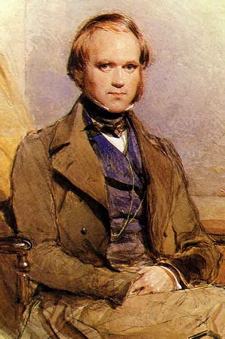On the Origins of New Forms of Life
6.2 Darwin's Emphasis on Gradualism
EUGENE M. MCCARTHY, PHD GENETICS
|
|
(Continued from the previous page)

|
| Charles Darwin |
From youth, apparently, Darwin believed gradualism is inherently more rational and scientific than saltational accounts of evolution. Thus, Mayr (1982: 509) asserts that
"In other words," says Gruber (1974: 126),
In Darwin's day many people considered rapid change unnatural. Many, especially those of the conservative upper crust to which Darwin belonged, felt any abrupt alteration was a threat to the social order. The French Revolution had recently strengthened acceptance in England of the idea that any sudden alteration was an inherent violation of the natural order. But the notion goes far back, to days when aristocracies strove to maintain the status quo. For example, in a Middle English translation of de Deguilleville's Le Pèlerinage de la Vie Humaine, Nature (personified) describes herself:
For j am not hastyf,
And al mutacioun that is doon in haste j hate.1
Anyone who opposed such views was branded a radical. Darwin seems to have harbored just such a traditional prejudice against sudden change, or at least to have been aware that many of his readers would hold such views.
It's no surprise, then, that Darwin's account of evolution does little to explain saltation, the abrupt production of new types of organisms. Certainly, his theory is lacking in this respect. Natural selection can have effect only if traits show variation. Virtually the only type of variation considered in the Origin is the minor sort seen in intrachromoset matings, not the major sort resulting from chromosomal mutations — the sort of variation, as Darwin describes it, seen in "a bird born with a beak 1/100th of an inch longer."2 However, it is now generally recognized that saltation — if one thinks of stabilization processes as examples of saltation — is in fact a natural process, not a supernatural one. But the production of new types of organisms, through stabilization processes, was largely unrecognized in Darwin's day.
Darwin's emphasis on the claim that breeding was a process of accumulating tiny differences is puzzling since he admitted he could not observe such differences himself. In the Origin he states this inability explicitly:
Presumably, then, not one person in a thousand had ever observed the sort of variation on which Darwin's theory is based, nor had he observed it himself!
Notes:
(Works Cited)
1. De Deguileville (1975). In modern English:
That that I do I do by leisure,
for I am not hasty,
and all mutation that is done in haste I hate.
2. In a letter to Sir Charles Lyell dated January 22, 1865, Darwin used this example to illustrate the sort of variation that he thought natural selection worked on. In the next sentence he went on to say that "The more I work, the more I feel convinced that it is by the accumulation of such extremely slight variations that new species arise" (Darwin 1887: vol. III, 33).
3. Darwin (1859: 32).